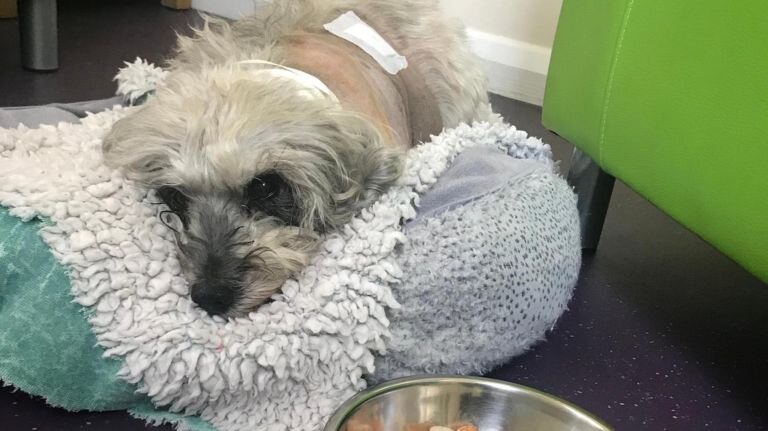His dog was dying. Flying overseas was the only hope.
From Newsday By Gabriella Vukelic gabriella.vukelic@newsday.com
Kobe Wong a day after heart surgery in London. Credit: Matthew Wong/Matthew Wong
When Matthew Wong got married in June, his dog, Kobe, was in a tux at his side, greeting family and friends as they took their seats. Afterward, Wong’s sister noticed the deaf 11-year-old Maltese was struggling to breathe. Even in the days before the wedding, Kobe seemed to be tired, less interested in playing fetch and had trouble taking walks.
The next day, Wong — who named the dog after Kobe Bryant because he "was my hero growing up" — took his dog to an emergency veterinary clinic where he was diagnosed with mitral valve disease (MVD). The cords in his heart were weakening, causing his heart to enlarge and leading to heart failure. It’s a disease that occurs in small-breed dogs (particularly the Cavalier King Charles spaniel breed) between the ages 8 to 10.
The vet said medication could slow down the disease’s progress, but to expect Kobe to live only another six months to a year.
His dog was dying. Flying overseas was the only hope. I was “depressed and sad, I moped about how my dog was going to die,” said Wong. Then, he discovered there was another option — a type of heart surgery on dogs, done only in a few places in the world.
The procedure, mitral valve repair (MVR), was created in Japan by Dr. Masami Uechi. It was also performed in London by Dr. Daniel Brockman, who was trained by Dr. Uechi. (The clinic in London, Royal Veterinary College (RVC) said earlier this year that they are suspending all cardiothoracic surgeries due to unplanned staff shortages. All the dogs who had set surgery dates in the coming months have received emails from the RVC that their surgery was canceled and that they will be receiving a refund.)
The surgery isn’t available anymore in the United States due to its low success rate here and the expense of designing a facility, said Dr. Philip Fox, of the American College of Veterinary Internal Medicine at the Animal Medical Center in NYC.
Another barrier is it costs about $20,000 or more.
It’s not covered by pet insurance, and since it’s only available overseas now, pet owners may spend $40,000 to $65,000 when you add in travel and lodging costs. A handful of Long Islanders who have chosen the surgery have had to burn through savings, or even sell their car. Even if the surgery is successful, the repair extends their life but doesn’t cure them.
Matthew and his wife Tina struggled with what to do, talking it over with family and friends for days. But ultimately, they decided to spend their “life savings to save Kobe’s life.”
“I couldn’t go to bed at night knowing I could let my little guy down,” said Wong.
Wong, a former East Meadow resident, took Kobe to Dr. Josh Morgenstern, a veterinary cardiologist at the Veterinary Medical Center of Long Island in West Islip. He helped determine that Kobe was a good candidate for the surgery. It’s an extensive process — the teams abroad need echocardiogram scans, cardiologist echo reports, the dog’s full medical history and cardiovascular history, blood work, copies of chest X-rays, a list of their current medication and its doses.
During this process, Kobe fell into congestive heart failure, so he was able to get an earlier surgery date.
“It was a rush to book flights and lodging on the fly,” Wong said, and also get all the paperwork filed in time for Heathrow Airport to allow his dog into the country. Wong, who works for a finance company, arranged to work out of a London office while Kobe was staying at the RVC.
In early December, the Wongs and Kobe flew into London.
He went into the operating room on Dec. 10. Because Dr. Brockman says the success rate is “currently just a little better than about 90%,” Wong said, “we were on pins and needles — but he survived the surgery and did well.”
Kobe ate chicken and drank water a day later, which was a good sign. He stayed at the hospital for monitoring but after being released he immediately jumped on the hotel bed, which could be bad for his recovery process. So the Wongs placed their mattress on the floor for Kobe to rest on until they got back home shortly after Christmas. Dr. Brockman told the Wongs that Kobe can’t go up and down stairs, or jump on a bed or couch for the next few months. About a month after returning, Kobe had his first appointment with Dr. Morgenstern who said his heart size is normal and that this is the best repair he's seen in a dog.“
Kobe is family for me personally, and I know there are many people who think that this is crazy to do this for a dog,” Wong said.
“But for family we’re willing to do anything sometimes.”
The Mighty Hearts MVD Community
Kobe wasn't alone. Wong came across a Facebook group called Mighty Hearts MVD Community, where pet owners blog about their experiences with MVD, share advice and educate each other on the disease and options for surgery from all over the world. In the group, he connected with Long Islanders who have traveled to London and France to get surgery for their dog and have given him advice on what to expect. The Mighty Hearts Project Organization runs the Facebook group and is also available for pet owners who want more information on the surgical options. Here are some Long Island dogs who successfully had the surgery.
George: Home in time for Christmas
George after surgery at the RVC in London. Credit: Lauren Francesca
Former Roslyn resident Lauren Francesca, who now lives in Queens, also took her schnoodle George to London in December, a few days before Kobe. George had already suffered two bouts of congestive heart failure and Francesca was hesitant to fly her dog overseas since a friend’s dog hadn’t made it through the surgery. But vitamins and medicine weren’t going to keep him alive.\
She had four days to make travel arrangements, making the trip even more expensive because she had a short time to plan, and Brockman said the surgery went “as good as it could have gone.” George was able to return home in time for Christmas but is now limping possibly due to arthritis.
Tiger: ‘We couldn’t see her pre-surgery’
Tiger after surgery at the RVC in London. Credit: Amy Sinensky
Exactly a year before Kobe had his surgery, Amy and Rich Sinensky’s dog Tiger was in RVC for her surgery. Tiger, a cockapoo, had been active and happy — but with a persistent, hacking cough.
The Sinensky’s primary veterinarian told them that Tiger, then 9, probably had a year to live with medication. He then referred them to a cardiologist and the Mighty Hearts site.
Morgenstern diagnosed her with a heart murmur, MVD and severe pulmonary hypertension and put her on a mix of medications to keep her stable until her surgery.
After an overnight flight to London, Tiger had a pre-op appointment. She wasn’t acting herself and the RVC heard crackling in her lungs, so they kept her overnight for observation. She rapidly deteriorated into full congestive heart failure and was kept on a ventilator in the hospital until the surgery.
“We couldn’t see her pre-surgery as the doctors were afraid any excitement might upset the delicate balance. The surgery was successful and Tiger made it through all the hurdles the first few days,” said Amy.
A year later, Tiger’s heart is still enlarged and her trachea is collapsing due to the severe pulmonary hypertension. She still has a hacking cough but the repair has locked the valve in place to prevent further deterioration.
Cayden: “The whole situation gave me, as the Italians call it, ‘agita.’
Cayden after surgery at the RVC in London. Credit: Carolyn Lobosco
After Tiger’s surgery, Amy was able to help Carolyn Lobosco of Merrick with her own dog, Cayden.
Cayden is a Cavalier and that breed is known to have heart disease. She “didn’t want any surprises” so she was already taking him for yearly echocardiograms. The veterinarian was also prescribing high dosages of medication to Cayden for cardiac issues. He then developed a cough and at one point lost his appetite.
Carolyn was then recommended to Mogenstern who cut his dosage in half and diagnosed him with MVD. He suggested Carolyn join the Facebook group and connect with the Sinenskys, who had just come back from London with Tiger.
“Amy sent me her list of everything I needed to do, there’s a lot of paperwork so she walked me through it all,” said Lobosco, 73. “The whole situation gave me, as the Italians call it, ‘agita.’
”Cayden wound up losing seven pounds after surgery and his heart is now stable. Plus, the Sinenskys and Loboscos are friends — which is common for many pet owners who have joined the Facebook group.“
I kept in touch with Amy after surgery. She came over, met Cayden and we went out to dinner and talked a lot,” said Carolyn. “When I was in London, there were two other couples there who had dogs getting surgery. They all loved Cayden’s black motorcycle jacket so when I got home, I bought jackets for all of the dogs we met in London and a pink one for Tiger. I wanted us to be like on a team.”
Tiffany: “I was up until 4 in the morning searching the Internet”
Tiffany after surgery at Clinique Veterinaire Bozon in France. Credit: Margaret Federico
Margaret Federico, took her maltipoo Tiffany to the vet for a persistent cough, and was told she was in congestive heart failure with five ruptured heart chords.
“That night I was up until four in the morning searching the Internet,” Federico, of Massapequa, said. “I came across a blog from a woman whose dog had heart surgery with Dr. Uechi.”
Federico found out Uechi was traveling to France to perform the procedure and he agreed to do an additional surgery for Tiffany while he was there.
Tiffany’s heart was severely enlarged, but after the surgical team finished the procedure it started beating right away without requiring defibrillation, which is often necessary. Tiffany took an echocardiogram in France a week after surgery, while still in the hospital, and her heart had shrunk significantly — just within the parameters of normal size.
Tiffany is now 11 and is no longer on medication. She plays with her toys, enjoys her daily walks and barks at the door when guests come.





